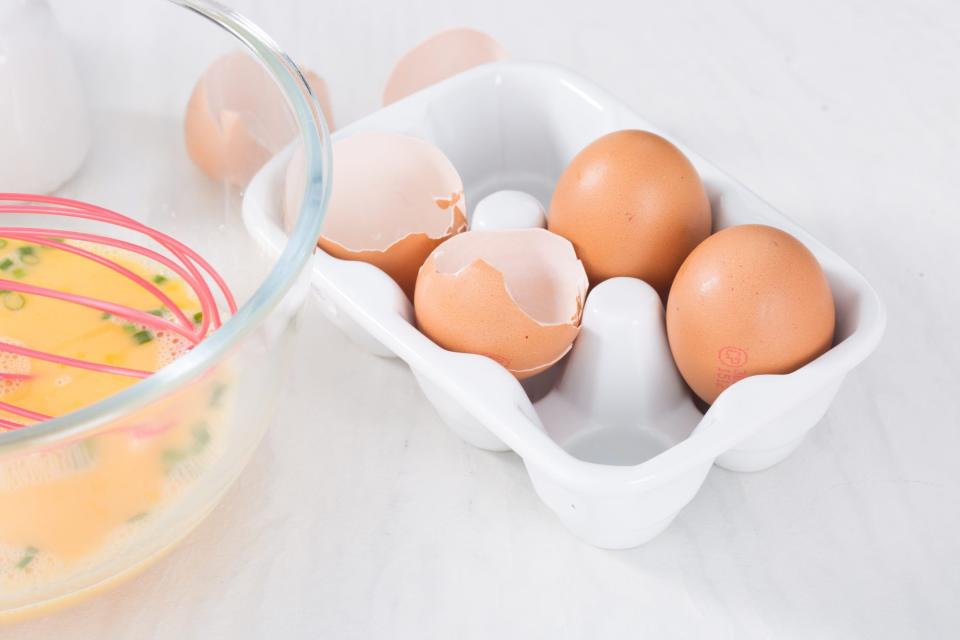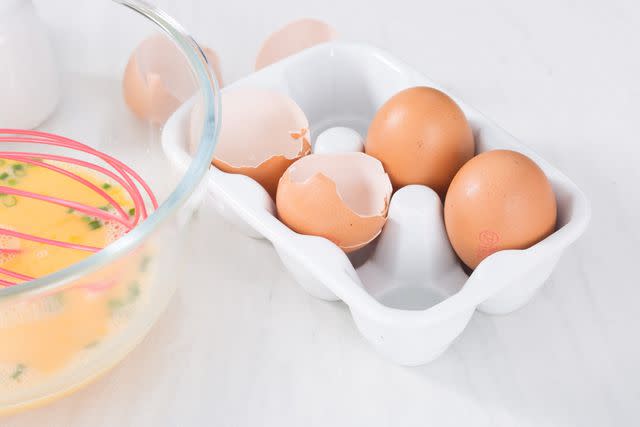Why You Should Never (Ever) Put Eggshells Back In The Carton
Three words: reservoir for bacteria.

Fact checked by Elizabeth BerryMedically reviewed by Jerlyn Jones, MS, MPA, RDN, LD, CLT
Sure, it's a convenient way to keep things tidy when you're baking up a storm, but it turns out that putting eggshells back in the carton with the rest of your uncracked eggs is a big food safety no-no. The reason? Cross-contamination.
When it comes to handling eggshells in the kitchen, there are some precautions to take. But did you know there are some good uses for those used eggshells? Here's how to keep everything clean and some better uses for your empty shells.

Storing Eggs
First things first. When shopping for eggs, always check for shells that are clean with no cracks. It's no fun to find out the hard way that the egg carton you chose at the store contained a leaky cracked egg. Despite the mess, there's risk of exposure to bacteria like salmonella. If you are the culprit and accidentally crack an egg that you aren't planning to use right away, transfer it to a clean, lidded container and refrigerate for up to two days. Cooking it fully will kill any bacteria that may form.
Store eggs in their original container in the coldest part of the refrigerator, the middle or bottom shelf. Save the egg compartment on the door for condiments like ketchup and mustard. Storing eggs on the door subjects them to temperature changes every time the door is opened and closed. Use eggs within three weeks of buying.
Avoiding Bacteria
Unfortunately, bacteria can be lurking on the outside, as well as the inside of your eggs, so make sure to wash your hands after handling them. And, according to Egg Safety Center, storing fresh eggs and eggshells together "greatly increases the risk of bacteria transfer by hands, utensils, air, etc." The organization goes on to warn against reusing egg cartons at all, as they can become a "reservoir for bacteria."
Gulp.
And if we're being honest, it's also just an all-around bad habit to fall into. Empty eggshells have no business in your clean fridge. Sorry.
Using Eggshells
So, instead of holding onto potentially harmful waste, err on the safe side and throw away empty cartons and cracked shells immediately. Or, better yet, toss the shells in a compost bin or use them in your garden.
The nutrients in eggshells make them an inexpensive fertilizer for plants. You can steep them in boiling water overnight to make eggshell water or crush the eggshells in a food processor. Your garden will thank you. Eggshells are a good source of calcium carbonate, which encourages growth and lengthens the life of a plant. It lowers the soil's pH level, making it more alkaline and less acidic. Be sure to know your plants though. You don't want to use eggshells on plants that prefer acidic soil.
Eggshells also help prevent calcium deficiency that causes black spots known as blossom-end rot in fruit-bearing plants, and they discourage pests like deer and some bugs from nibbling your garden.
Starting Seeds
Because eggshells are so nutrient-rich for your garden, they make great vessels for starting seeds. When the seedling is ready for transplanting, the entire thing, shell and all, can go right into the ground or a pot. Just make sure to give the shell a squeeze so the roots can grow. The eggshell will decompose and help fertilize the plant.
For more Southern Living news, make sure to sign up for our newsletter!
Read the original article on Southern Living.

